The pet food pulverizer market is valued at USD 108.2 million in 2025 and is forecasted to reach USD 169.7 million by 2035, advancing at a CAGR of 4.6%. Market growth is supported by rising global pet ownership, expanding commercial pet food production, and increasing focus on nutritional consistency and texture uniformity in processed feed. The shift toward premium and specialized pet diets, including grain-free and protein-rich formulations, continues to drive demand for precision grinding and particle size control equipment.
Hammer mill pulverizers account for the leading market share due to their high throughput efficiency, adaptability to diverse raw materials, and ability to deliver uniform particle size distribution essential for extrusion and pelleting processes. Their robust design, ease of maintenance, and operational reliability make them suitable for continuous production environments. Technological improvements in energy efficiency, noise reduction, and automated control systems further enhance productivity and process stability.
Asia Pacific leads global growth, driven by expanding pet food manufacturing capacity in China, India, and Southeast Asia. Europe and North America maintain steady demand through established pet food brands and innovation in feed formulation. Key market participants include CPM, LASKA, Bühler Group, Fragola S.p.A., Ottevanger Milling Engineers, Andritz, and WAMGROUP S.p.A., focusing on equipment durability, grinding precision, and process automation.
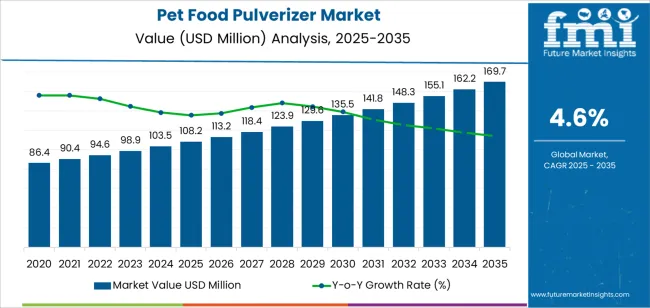
Saturation point analysis indicates that the market is in a mid-growth phase, with expansion driven by increasing demand for premium and nutritionally balanced pet food products. Between 2025 and 2029, growth will remain strong as manufacturers invest in processing technologies that improve ingredient consistency, digestibility, and production efficiency. Rising global pet ownership and the shift toward specialized dietary formulations will maintain early momentum.
Between 2030 and 2035, the market is expected to approach its initial saturation point as major processing facilities achieve capacity optimization and equipment upgrades become cyclical rather than expansionary. Growth will slow modestly as the industry stabilizes in mature markets, particularly in North America and Europe, where pet food manufacturing is already highly automated. However, emerging economies in Asia-Pacific and Latin America will extend the growth curve through industrial scaling and new plant installations. The overall pattern suggests a gradual move toward operational maturity, supported by technological refinement, steady replacement demand, and the continued evolution of high-performance pulverizing equipment in global pet food production.
| Metric | Value |
|---|---|
| Market Value (2025) | USD 108.2 million |
| Market Forecast Value (2035) | USD 169.7 million |
| Forecast CAGR (2025-2035) | 4.6% |
The pet-food pulverizer market is expanding as pet-food manufacturers increasingly require finely and uniformly processed ingredients such as proteins, grains, and novel feed additives. As pet ownership rises globally and consumers demand premium pet-food formulations, producers rely on pulverization equipment to achieve optimal particle size, consistent mixing, and improved digestibility. Advances in pulverizer technology offer enhanced energy efficiency, finer grinding capabilities, and integration with automation and process control systems, which support throughput scalability and cost effectiveness.
The trend toward alternative proteins, functional additives and tailored formulations reinforces the need for precision pulverizing systems that can handle varied raw-material properties. Manufacturers are also adapting equipment for diverse feedstock types, including insect protein, plant-based ingredients and novel composites, requiring flexible pulverizer solutions. Market constraints include high capital investment for advanced pulverizing machinery, maintenance requirements for wear-intensive components, and variable adoption rates among small-scale feed producers, particularly in emerging regions with limited infrastructure.
The pet food pulverizer market is segmented by product type and application. By product type, the market is divided into hammer mill pulverizer and vertical pulverizer. Based on application, it is categorized into dog food, cat food, and others. Regionally, the market is divided into Asia Pacific, Europe, North America, and other key regions.
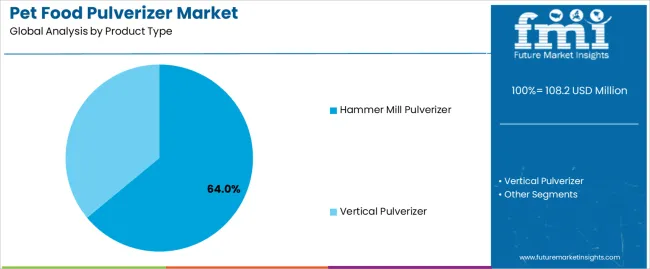
The hammer mill pulverizer segment holds the leading position in the pet food pulverizer market, representing an estimated 64.0% of total market share in 2025. Hammer mill pulverizers are widely used in pet food manufacturing due to their efficiency in reducing raw material particle size, uniform grinding performance, and adaptability to various feed formulations. These machines operate by repeated impact of hammers on ingredients, producing consistent granulation that supports better mixing and extrusion in downstream processes.
The segment’s dominance is supported by its cost-effectiveness, ease of maintenance, and ability to handle a wide range of materials such as grains, meat meal, and additives. Its high throughput capacity makes it particularly suitable for large-scale pet food production lines. The vertical pulverizer segment, estimated at 36.0%, is gaining traction in premium pet food manufacturing where finer particle control and improved material distribution are required for specialized formulations.
Key factors supporting the hammer mill pulverizer segment include:
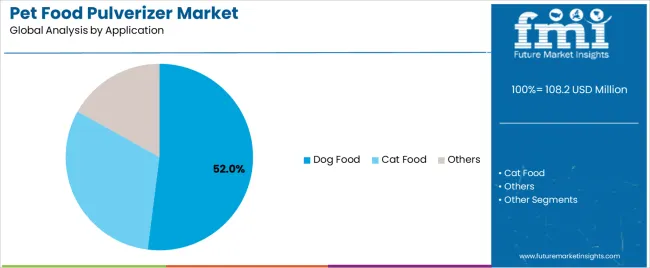
The dog food segment accounts for approximately 52.0% of the pet food pulverizer market in 2025. This dominance reflects the large global demand for dog food, supported by higher consumption volumes and product diversification within the pet nutrition industry. Pulverizers are essential in dog food production to achieve uniform texture, enhanced digestibility, and stable extrusion performance, ensuring consistent nutrient distribution in both dry and wet formulations.
The cat food segment follows, representing about 34.0% of the market, driven by increasing demand for premium and specialized cat diets that require fine grinding for protein uniformity and palatability. The others category, including feed for small pets and aquatic animals, accounts for the remaining 14.0%, supported by steady adoption of pulverization equipment in niche pet feed applications.
Primary dynamics driving demand from the dog food segment include:
Rising pet-food production volumes, demand for finer ingredient processing, and regulatory hygiene standards are driving market growth.
The pet food pulverizer market is expanding because global pet-ownership rates are increasing, which boosts production of dry kibble, treats and expanded pet-food product formats. Ingredient processing in pet-food manufacture increasingly requires pulverization to achieve consistent particle size for binding, digestibility and nutritional uniformity. Hygienic manufacturing standards and clean-in-place (CIP) protocols push equipment makers toward designs optimized for food-grade pulverizers with stainless-steel construction and low contamination risk. Specialization in pet food (versus generic feed) means pulverizer systems tailored to ingredient types, meats, grains, co-products, support higher adoption among pet-food manufacturers.
Capital cost, variable input stream characteristics and maintenance intensity limit adoption.
Industrial pulverizers designed specifically for pet-food ingredients often have significant upfront cost, making them less accessible for smaller or start-up pet-food producers. Input streams in pet-food manufacture can vary greatly, from proteins and grains to by-products and fats, which demands flexible pulverizer capability; inconsistent feedstock properties can challenge processing efficiency and equipment wear. Maintenance and downtime risk increase where pulverization produces fine dust, requires frequent cleaning and may suffer wear on blades/screens; such operational burdens can deter rapid expansion of pulverization equipment.
Modular, flexible pulverizer systems, growth in emerging pet-food markets and integration with automation & quality-control systems are shaping the market.
Equipment manufacturers are supplying modular pulverizer units that can be scaled, swapped out or repurposed as pet-food lines evolve (for example to new treat formats or grain-free recipes). Growth in pet-food manufacturing capacity in regions such as Asia-Pacific and Latin America is generating new demand for pulverization equipment locally rather than importing packaged lines. Pulverizers are increasingly integrated with plant-automation, quality-control and dust-management systems to ensure consistent particle size distribution, traceability and hygienic operation, aligning with higher-end pet-food production specifications.
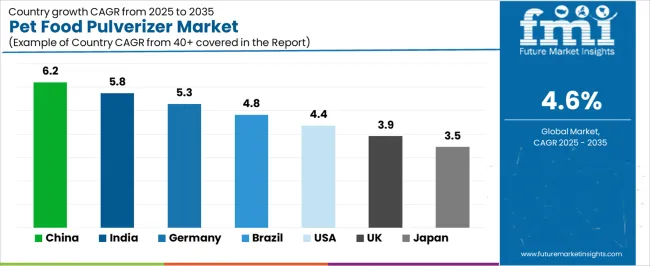
The global pet food pulverizer market is growing steadily through 2035, driven by increasing pet ownership, industrial-scale feed manufacturing, and the demand for consistent product texture and nutritional uniformity. China leads with a 6.2% CAGR, followed by India at 5.8%, reflecting strong expansion in companion animal care and feed processing industries. Germany grows at 5.3%, emphasizing automation and hygiene in food machinery. Brazil records 4.8%, supported by pet food exports and livestock diversification. The United States posts 4.4%, driven by advanced production facilities and ecofriendly feed innovation, while the United Kingdom (3.9%) and Japan (3.5%) maintain moderate growth through precision processing and high-quality ingredient use.
| Country | CAGR (%) |
|---|---|
| China | 6.2 |
| India | 5.8 |
| Germany | 5.3 |
| Brazil | 4.8 |
| USA | 4.4 |
| UK | 3.9 |
| Japan | 3.5 |
China’s pet food pulverizer market grows at 6.2% CAGR, driven by rising urban pet ownership, expanding domestic pet food brands, and advanced feed processing technology. Local manufacturers are producing high-efficiency pulverizers capable of achieving uniform particle size for dry and semi-moist pet food formulations. Automation in feed plants improves production consistency and nutritional control. The government’s focus on pet product quality and safety standards further strengthens market performance. Export demand for processed feed machinery across Southeast Asia and Africa supports long-term growth and production scalability.
Key Market Factors:
India’s market grows at 5.8% CAGR, supported by growth in commercial pet food manufacturing, urban pet adoption, and equipment modernization. Domestic producers are investing in automated pulverizer systems that deliver consistent grinding quality for cereals, meat, and grain-based pet feed formulations. The Production Linked Incentive (PLI) Scheme and Make in India initiative encourage local machinery development and import substitution. Pet food producers are expanding their processing facilities to meet domestic and export demands. Increased focus on nutritional uniformity and equipment energy efficiency is driving product upgrades across mid-sized feed manufacturers.
Market Development Factors:
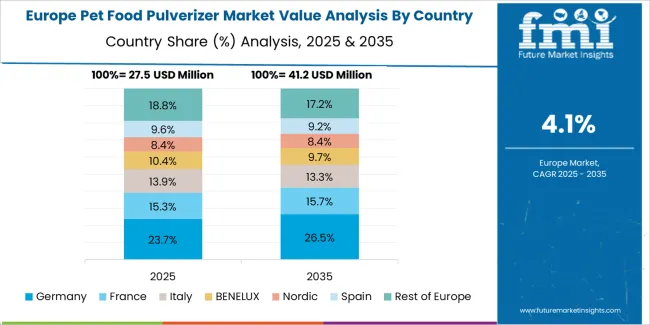
Germany’s market grows at 5.3% CAGR, driven by technological innovation, regulatory precision, and ecofriendly in pet food production. Manufacturers are producing advanced pulverizers integrating hygienic design, stainless steel construction, and automatic dust control systems. Compliance with EU Feed Hygiene Regulation (EC No. 183/2005) supports the development of equipment designed for contamination-free processing. Demand for specialized pulverizers in high-protein and grain-free pet food formulations continues to grow. Integration of digital monitoring and energy optimization systems enhances operational efficiency across production lines.
Key Market Characteristics:
Brazil’s market grows at 4.8% CAGR, supported by the expansion of local pet food manufacturing, agricultural exports, and industrial modernization. The country’s strong agribusiness base provides access to diverse raw materials used in pet feed formulations. Domestic equipment manufacturers are focusing on durable pulverizers suitable for bulk processing and tropical climate conditions. The Agro 4.0 initiative promotes automation and process optimization across food industries. Growth in private-label pet food production and export activity strengthens equipment demand across regional processing hubs.
Market Development Factors:
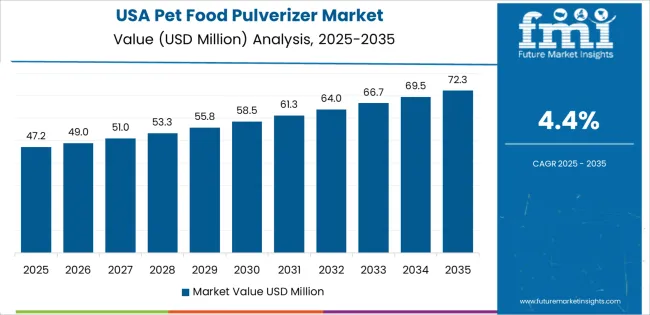
The United States grows at 4.4% CAGR, driven by innovation in high-capacity feed systems, pet food diversification, and ecofriendly goals. Leading manufacturers are integrating advanced motor control and digital automation into pulverizer designs for large-scale production. The Food Safety Modernization Act (FSMA) regulates feed hygiene and process safety, encouraging adoption of closed-loop pulverization systems. Rising demand for grain-free, protein-rich, and functional pet foods supports precision grinding applications. Ongoing R&D focuses on minimizing energy consumption while maintaining consistent particle distribution across product batches.
Key Market Factors:
The United Kingdom’s market grows at 3.9% CAGR, supported by green manufacturing practices, export expansion, and food technology innovation. British manufacturers are developing compact pulverizers with advanced filtration and temperature control systems to meet hygiene standards. The UK Pet Food Manufacturers’ Association (PFMA) promotes local production quality and export competitiveness. Increased investment in automation for small and medium feed enterprises is improving productivity and waste reduction. The focus on recyclable packaging and ecofriendly feed processing further contributes to industrial modernization.
Market Development Factors:
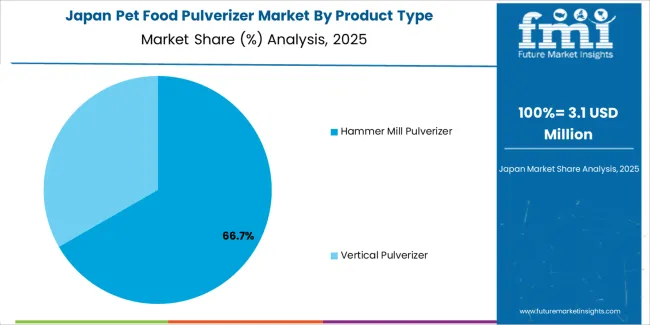
Japan’s market grows at 3.5% CAGR, reflecting technological precision, compact design innovation, and demand for premium pet feed production. Domestic equipment firms specialize in small-scale, high-efficiency pulverizers for precision grinding of protein and fish-based feed. Integration of automated load balancing and vibration reduction systems improves performance consistency. The Green Innovation Fund supports R&D in low-noise, energy-efficient food machinery. Growth in domestic premium pet food brands and export activities to Southeast Asia contributes to sustained market expansion.
Key Market Characteristics:
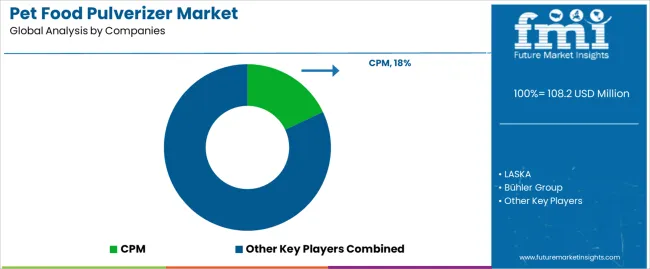
The pet food pulverizer market is moderately consolidated, with around fifteen global and regional manufacturers competing across feed processing, milling, and extrusion equipment. CPM leads the market with an estimated 18.0% global share, supported by its long-established expertise in feed and biomass grinding systems, precision milling technology, and strong presence across North America and Europe. Its leadership is reinforced by robust service infrastructure and proven operational efficiency in large-scale pet food production facilities.
LASKA, Bühler Group, and Fragola S.p.A. follow as major international competitors, offering advanced pulverizing and size-reduction systems integrated with automated feed lines. Their competitive strengths lie in energy-efficient designs, hygienic construction, and consistent particle uniformity essential for premium pet food formulations. Ottevanger Milling Engineers, Andritz, and WAMGROUP S.p.A. maintain strong mid-tier positions, focusing on turnkey feed plant solutions and modular system design suited to various production capacities.
Chinese manufacturers such as Jiangsu Quanmu, Jiangsu Zhengchang, Jiangsu Famsun, and Jiangsu Kerunde Intelligent Equipment Group dominate regional supply through cost-competitive production, customization flexibility, and alignment with the rapidly expanding Asia-Pacific pet food industry. Emerging suppliers like Jiangyin Baoli Machinery, Intelidura Machinery, and Jiangyin Powder Mill Technology provide specialized small-scale pulverizers for niche applications.
Competition in this market revolves around grinding efficiency, output uniformity, and operational reliability. Demand growth is driven by the expansion of commercial pet food manufacturing and the rising focus on high-quality feed texture, consistent particle size distribution, and compliance with global food safety and animal nutrition standards.
| Items | Values |
|---|---|
| Quantitative Units | USD million |
| Product Type | Hammer Mill Pulverizer, Vertical Pulverizer |
| Application | Dog Food, Cat Food, Others |
| Regions Covered | Asia Pacific, Europe, North America, Latin America, Middle East & Africa |
| Countries Covered | India, China, USA, Germany, South Korea, Japan, Italy, and 40+ countries |
| Key Companies Profiled | CPM, LASKA, Bühler Group, Fragola S.p.A., Ottevanger Milling Engineers, Andritz, WAMGROUP S.p.A., Handtmann Maschinenfabrik GmbH & Co. KG, TIETJEN Verfahrenstechnik GmbH, Jiangsu Quanmu Co., Ltd., Jiangyin Baoli Machinery Manufacturing Co., Ltd., Intelidura Machinery Co., Ltd. |
| Additional Attributes | Dollar sales by product type and application categories; regional adoption trends across Asia Pacific, Europe, and North America; competitive landscape of feed processing and pulverizer equipment manufacturers; advancements in precision grinding and feed homogenization technologies; integration with automated pet food production and processing systems. |
The global pet food pulverizer market is estimated to be valued at USD 108.2 million in 2025.
The market size for the pet food pulverizer market is projected to reach USD 169.7 million by 2035.
The pet food pulverizer market is expected to grow at a 4.6% CAGR between 2025 and 2035.
The key product types in pet food pulverizer market are hammer mill pulverizer and vertical pulverizer.
In terms of application, dog food segment to command 52.0% share in the pet food pulverizer market in 2025.






Our Research Products

The "Full Research Suite" delivers actionable market intel, deep dives on markets or technologies, so clients act faster, cut risk, and unlock growth.

The Leaderboard benchmarks and ranks top vendors, classifying them as Established Leaders, Leading Challengers, or Disruptors & Challengers.

Locates where complements amplify value and substitutes erode it, forecasting net impact by horizon

We deliver granular, decision-grade intel: market sizing, 5-year forecasts, pricing, adoption, usage, revenue, and operational KPIs—plus competitor tracking, regulation, and value chains—across 60 countries broadly.

Spot the shifts before they hit your P&L. We track inflection points, adoption curves, pricing moves, and ecosystem plays to show where demand is heading, why it is changing, and what to do next across high-growth markets and disruptive tech

Real-time reads of user behavior. We track shifting priorities, perceptions of today’s and next-gen services, and provider experience, then pace how fast tech moves from trial to adoption, blending buyer, consumer, and channel inputs with social signals (#WhySwitch, #UX).

Partner with our analyst team to build a custom report designed around your business priorities. From analysing market trends to assessing competitors or crafting bespoke datasets, we tailor insights to your needs.
Supplier Intelligence
Discovery & Profiling
Capacity & Footprint
Performance & Risk
Compliance & Governance
Commercial Readiness
Who Supplies Whom
Scorecards & Shortlists
Playbooks & Docs
Category Intelligence
Definition & Scope
Demand & Use Cases
Cost Drivers
Market Structure
Supply Chain Map
Trade & Policy
Operating Norms
Deliverables
Buyer Intelligence
Account Basics
Spend & Scope
Procurement Model
Vendor Requirements
Terms & Policies
Entry Strategy
Pain Points & Triggers
Outputs
Pricing Analysis
Benchmarks
Trends
Should-Cost
Indexation
Landed Cost
Commercial Terms
Deliverables
Brand Analysis
Positioning & Value Prop
Share & Presence
Customer Evidence
Go-to-Market
Digital & Reputation
Compliance & Trust
KPIs & Gaps
Outputs
Full Research Suite comprises of:
Market outlook & trends analysis
Interviews & case studies
Strategic recommendations
Vendor profiles & capabilities analysis
5-year forecasts
8 regions and 60+ country-level data splits
Market segment data splits
12 months of continuous data updates
DELIVERED AS:
PDF EXCEL ONLINE
PET Film for Face Shield Market Size and Share Forecast Outlook 2025 to 2035
Pet Perfume Market Size and Share Forecast Outlook 2025 to 2035
Pet Shampoo Market Size and Share Forecast Outlook 2025 to 2035
Pet Tick and Flea Prevention Market Forecast and Outlook 2025 to 2035
Pet Hotel Market Forecast and Outlook 2025 to 2035
PET Vascular Prosthesis Market Size and Share Forecast Outlook 2025 to 2035
Petroleum Liquid Feedstock Market Size and Share Forecast Outlook 2025 to 2035
PET Stretch Blow Molding Machines Market Size and Share Forecast Outlook 2025 to 2035
PET Injectors Market Size and Share Forecast Outlook 2025 to 2035
PET Material Packaging Market Size and Share Forecast Outlook 2025 to 2035
Petri Dishes Market Size and Share Forecast Outlook 2025 to 2035
Petroleum And Fuel Dyes and Markers Market Size and Share Forecast Outlook 2025 to 2035
Petrochemical Pumps Market Size and Share Forecast Outlook 2025 to 2035
PET Dome Lids Market Size and Share Forecast Outlook 2025 to 2035
Pet Dietary Supplement Market Size and Share Forecast Outlook 2025 to 2035
PET Imaging Workflow Market Analysis - Size, Share, and Forecast Outlook 2025 to 2035
Petroleum Refinery Merchant Hydrogen Generation Market Size and Share Forecast Outlook 2025 to 2035
Pet Bird Health Market Size and Share Forecast Outlook 2025 to 2035
PET Film Coated Steel Coil Market Size and Share Forecast Outlook 2025 to 2035
Petroleum Refinery Hydrogen Market Size and Share Forecast Outlook 2025 to 2035

Thank you!
You will receive an email from our Business Development Manager. Please be sure to check your SPAM/JUNK folder too.
Chat With
MaRIA